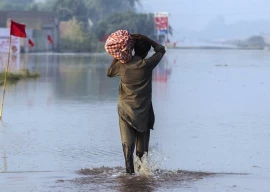
As far as interviews go, this one just doesn’t seem to be working for me. We’re sitting on a lovely terrace in Shafi’s Lahore home, sipping on coffee as birds chirp in the background. But in contrast to the idyllic surroundings, the chemistry between us is awkward to say the least.
Our introduction to each other does not contain any extraneous social niceties, no flowery language or complimenting of each others’ clothes. She stares at me with a steely gaze as she sips her coffee, daring me to begin questioning her.
When I do, many of my open-ended questions about Shafi’s career warrant a demand to be more specific, upon which answers are produced down to the factual tee, devoid of any funny anecdotes, endearing neuroses or silly regrets that might give me colour for my story. ‘Oh boy,’ I think, ‘this is going to be fun.’
I had been forewarned about this: her stand-offish nature, no-nonsense attitude and blunt statements — an impression that doesn’t really fit in with the cute bob haircut, MnM tattoo on her arm and colorful wardrobe choices that stand out in her photographs or at social events.
Apparently, this is how Shafi is, and always has been — take it or leave it. I take it, because while this situation may be uncomfortable, it is surprisingly refreshing.
Her attitude certainly seems to have worked in her favour. Most of what she has dabbled in has hit it big. Really big.
From her first ever acting stint at 17, as Jawad Ahmed’s girlfriend in the video Bin Teray Kya Hai Jeena which was nationally adored, to her singing performance in Coke Studio with Arif Lohar, a video that two years later remains the most watched Coke Studio song ever, with 10 million views crossed just last week.
Her foray into modelling has resulted in countless ramp shows, a brand ambassador-ship for L’Oreal Paris, magazine covers and editorials in international publications as high brow as L’Officiel and Vogue India.
What would be a career high point for most others is only the beginning for Meesha and she is now about to appear in four (yes, four) movies.
In addition to the Hollywood production The Reluctant Fundamentalist, directed by award-winning filmmaker Mira Nair, that recently launched the Venice Film Festival, Shafi is also waiting for the release of Waar, a Lollywood film directed by Bilal Lashari.
Then she is also currently filming for a Bollywood movie titled Bhaag Milkha Bhaag, directed by Rakesh Om Prakash Mehra of Rang De Basanti fame. Here, she plays one of the love interests of legendary Olympic runner Milkha Singh, who in turn is being played by Farhan Akhtar.
She has also just signed on to a Hollywood production The Tournament of Shadows, a biopic set in the 1800s and directed by Jamil Dehlavi.
All this means that Shafi, a Pakistani model/singer who has just hit 30, is a mom and has never acted in a film before is attracting the kind of attention professional actors would sell their souls for.
Best of all, these opportunities seem to have simply walked up to her doorstep and presented themselves. “I don’t agree with the idea of approaching people and recommending myself. I think it’s kind of awkward and cheap,” she says firmly.
After hearing what Shafi had to offer during her stint with instrumental band Overload, “Coke Studio” producer Rohail Hyatt invited her to sing for the show’s third season, where he paired her up with famed folk singer Arif Lohar.
Her androgynous voice coupled with an unabashed sexuality catapulted Shafi into unprecedented fame both in Pakistan and beyond.
It is this solo success that is rumoured to have caused serious tension between Shafi and her former Overload bandmate Farhad Humayun, which turned into an ugly legal battle and left scars that might still be a little raw.
“If I’m not as experienced as you and I overtake you, are you going to hate me for that?” she questions.
With The Reluctant Fundamentalist, Shafi was selected without an official audition, despite not having much acting experience save the handful of TV dramas and theatre that she experimented with earlier on.
“Mira invited me to meet her when she was in Lahore scouting for actors. At that time I didn’t even know what I was going to meet her for,” she says.
But once the role was offered to her, Shafi did not hesitate in taking it up. “Opportunity comes, and I’ve been very lucky with that,” she says, “but after that your work begins.”
While Shafi lists her filmography, and I fervently jot it down on my notepad, she pauses and then breaks into giggles. I look up in shock to find her staring lovingly at her daughter who has waddled up to a net screen partition that divides the inside of her home from her terrace.
The one-year-old is smiling at her mother, tiny hands clutching the screen. From here onwards the interview gets much easier.
The screen opens and the baby stumbles onto the terrace. “I cut her fringe today and even all the help in the house were like ‘what have you done?’! She’s got a dumb and dumber fringe now,” she says, laughing.
“Sorry for making you look like a little idiot,” says Shafi, baby-talking to her little daughter, who giggles in pleasure. “Being a mom is the toughest and most rewarding job,” says Shafi, holding her daughter in her arms.
“But having your own baby around is the best way to distract you from anything … in a positive way,” she says. “It’s a great pick me. It really cheers you up.”
This is obvious with Shafi’s immediate shift in tone and demeanour. Her tiredness escapes her face, her stiff front breaks and all of a sudden Super Shafi starts talking about her feelings. Phew.
Leaving her daughter, then seven months old, in Lahore to film The Reluctant Fundamentalist for a spell of three weeks was one of the most difficult things Shafi has ever had to do.
“That is one thing I’ll never forget,” she says, with a pang of sadness in her voice. It is not difficult to see that this is an issue that Shafi struggles with, especially as career demands skyrocket and new roles take her to various parts of the globe.
“No matter how hard you work, most of the time the guilt that a mother feels when she leaves her child and goes to work … you cannot explain [that] to someone.”
The fact that Shafi herself is a product of a working mother, celebrated actress Saba Parvez, makes it easier for her to deal with this situation. “My mother’s work always kept her in Karachi.
She was a workaholic, but I know she had to do it because she was also the breadwinner. I’m not resentful for her absence at all and I never have been.”
When it came to her own childhood, Shafi found comfort in the joint family system she lived in. She was always shadowed by her grandparents and a horde of aunts, uncles and cousins. With her daughter however, it’s quite different.
“Still, something that a friend told me a while back has stuck with me. She asked me ‘Do you want to be the kind of mother that your daughter grows up to respect and admire or do you want to stay at home, grow fat and hear her tell you to leave her alone and give her some space and get off her back?’. I would definitely want to be the former.”
Despite the agony of having to leave loved ones and baby behind, the experience of working with some of the most talented and creative actors was worth the sacrifice.
The cast was collecting at Delhi, a location that poses as the Lahore in which Mohsin Hamid’s The Reluctant Fundamentalist is set. Hamid worked extensively with director Nair on the screenplay, which has been adapted to make it more exciting for the screen.
The cast includes a mix of high profile Hollywood and Bollywood actors, including Shabana Azmi, Om Puri, Keifer Sutherland, Liev Schreiber and Nelsan Ellis, who plays Lafayette on HBO’s True Blood.
The movie stars Riz Ahmed, a British-Pakistani actor who also played the lead in Chris Morris’s black comedy Four Lions. Here, He plays Changez, a young Pakistani in New York, who tries to chase the American Dream but gets disillusioned in the process and returns to Lahore, eventually becoming the fundamentalist of the book title. Shafi plays his sister, Bina, a role that fits her like a glove.
“Riz was the first person I met from the cast and most of my work was with him,” says Shafi.” It was uncanny to me how much he looked like my brother, and it was uncanny to him how much I looked like his sister.” The two actors clicked instantly and immediately developed a weird sibling-like connect.
“That chemistry that siblings do have it’s hard to get with some random stranger but it was just there,” she says, “and it made our jobs very easy.”
Shafi spent hours talking to Riz about Lahori culture and telling him about her family in order to aid his research on his character. Riz, who was born in Karachi was raised in England where he went to school and now lives, fell right back in love with Shafi: “She’s a cutting-edge, multi-talented artist at the forefront of pushing boundaries in film and music in South Asia. She has a huge following both inside and outside the region. As a strong woman and someone who defies typecasting, it seems to me her success is an important indicator of the region’s continued artistic growth,” he says, “and to top it all off she is ridiculously cool, fun and smart.”
Riz may have had to do his homework, but Shafi practically played herself. “I play a Lahori girl, very close to where I come from, so it was comfortable that way. The kind of family I belong to is very cultured and educated — old money but not rich, pre-colonial house, lots of art and books in the home, father is a poet, thinker and intellectual. That kind of stuff was easy for me to relate to. The values, the environment and the atmosphere, I could understand that.”
Shafi was herself raised in true Lahori fashion by the Punjabi side of her family. Despite the liberal background she comes from, her family was very in touch with their Lahori roots inculcating in her a deep love for the city she grew up in. “I’m a Lahori through and through — born and bred,” she says. “This city has given so much art, literature, theatre and music to our cultural heritage. From midnight swims in the famous Lahore Canal to breakfast in the walled city at dawn, Lahore is my past, present and hopefully, a big part of my days to come. Home is where the heart is. And my heart will always be in Lahore.”
The true Lahori girl in her came out during the last night of filmingThe Reluctant Fundamentalist in Delhi. One of Nair’s trademark wedding scenes was being shot, this time in a Lahori fashion. During the rehearsals for the scene, Shafi noticed the professional dancers in the background practicing their moves. “They were very pakka and they had very pakka dance moves,” she recalls, laughing. “And it’s not like that when you go to a wedding. The dulhan’s own friends are just doing something dheela. They’re plain simple girls just dancing for a good time.” Shafi then ended up making the dances for the scene, and helping the choreographers unlearn their skills and just let loose.
That doesn’t come as a surprise, as it is obvious from her history that Shafi is a very talented individual when it comes to art, performance or otherwise. She first tried her hand at fashion designing at Pakistan School of Fashion Design in Lahore, but only briefly. “That just bored the bajeezes out of me. I like fashion but I don’t want to make clothes for the market here. The kind of stuff I wanted to do or enjoy doing, there’s no market for that here. I mean I’ve always wanted to go into retail. Even at this point I’m really tempted to start maybe a thrift boutique or a vintage thing like collect stuff from around the world and throw it into a shop, but I don’t think people will understand it. That can be my retirement plan though,” she adds, smiling.
After a two-and-a-half year break, she enrolled in the National College of Arts and realised that that was where she was meant to be. It was also here that she met her now husband, musician Mehmood Rahman. The two got married after graduation and a little baby girl soon followed.
“Being pregnant was a little frustrating because till then I was just going with the flow. I didn’t imagine how overwhelming the response to those few projects I did was going to be. By the time people started noticing and counter projects followed, I was very pregnant,” says Shafi. But after a short hiatus, she was on her toes again. She is currently in the thick of filming Bhaag Milkha Bhaag in various parts of Indian Punjab and is extremely excited about The Tournament of Shadows.
While everything seems to be going more than perfectly, the only thing that bothers her is how Pakistani audiences might brush her off for the screen time she has in these films. “Are you the heroine?”, “Do you get the guy?” and “Is it a big role?” are some of the questions that Shafi constantly gets from people in Pakistan. “Everybody is kind of stuck on these questions and frankly it’s become a pet peeve of mine because I’ve gotten scripts for four boy-meets-girl movies which are commercial cinema from across the border and I could do those and answer these questions with a haanji main heroine hun. But frankly, 99 per cent of them are so mediocre,” she says. “I have no confusions or regrets of whether I would do a lead role in a B-grade movie or a smaller role in an A-grade movie. And I do feel that people don’t that understand here. I don’t want to be a part of a movie that even I couldn’t go and watch.”
Correction: The article erroneously named actor Riz Ahmed as Riz Khan. The error is regretted.
Published in The Express Tribune, Sunday Magazine, September 9th, 2012.
COMMENTS (29)
Comments are moderated and generally will be posted if they are on-topic and not abusive.
For more information, please see our Comments FAQ



1725967717-0/Untitled-design-(3)1725967717-0-165x106.webp)













Mira Nair and Jamil Dehlavi are independent producers - they are not Hollywod. As may also be obvious, they are from the subcontinent.
Pakistan should be proud of her and other girls who have taken the courage to go beyond the traditional image of Pakistan women.
what are you going to show !!!!!! there is nothing spacial in the style>>>>
Great piece Anam Mansuri!! Didn't know this side of Meesha, I'm also a fan of hers! She's hot and she is damn good at what she does! people are offended for no reason!
I really enjoyed the interview. The writer has a signature style (that made me feel a certain familiarity with Meesha Shafi) i dont come across that often. i think the inner monologue gave it soul. Journalism in Pakistan is generally so marred with outdated & mediocre use of language that i dont find it surprising at all that some people actually took offence. Well, boo hoo to that. Well done Anam!
Make change ....reality !!
Photos too plastic looking - tune done the photoshop will ya.
Make up and proper lighting can make South Asians look white. What is this fascination with white skin in the sub continent. Nobody in South Asia is happy with the skin they are in.
haha interesting how ppl are afraid of a successful good looking young girl
Big deal?? Even i look better than her - and i'm overweight and bald.
Reminds me of the lyrics by Akon, "I am trying to find the words to describe this girl, without being disrespectful" :p
Her father used to study @ Lawrence college Ghora Gali way back in 1975-77. Dont know where he is now and doing what .....???? God bless him.
I didn't get a chance to read the whole article (because of my laziness :)), but the opening lines do convey the fact that the author is bold and stands out from the pack in her writing style.
@Danish Mughal: I have never even heard of her. But I found the use of that word unnecessary and boorish.
She looks good in sleeveless as she has a small frame definitely sexy for men of today's era.
Its all makeup and wardrobe, nothing special.period
A very well written portraiture. It gives an insight of Meesha Shafi's work and life style. However it can hardly be called an interview. It became a drag and was just not coming to an end. While Anam Mansuri demonstrated her writing skill well, she did not let Meesha shine. This attitude is more apparent in TV talk show where anchor hardly ever listen to the guest and instead project them self by giving their viewpoint. Meesha is an accomplished artist and singer and we should be proud of her. Arshad Ali
First of all a lot of make up and chicken legs dont make her hot.she just looks like another freak outa heavy metal bar who is probably aneamic.And the language used in this artical clearly indicates the downfall of our cultural and religious values.do you guys not have any editors in tribune?
What a terribly written piece.
Girl on girl sexism, how uncool.
"B**", what a word to choose for praising Meesha.
Good lord! She looks like a slim and more beautiful version of Senora Bellucci.
@ Anam: Very very well-written, I'm not a big fan of her but I really loved how you put the story together. And it goes without saying, ignore the nasty haters!
Offensive and unnecessary language that has no relevance in the context of the article.
Ahaan!!! An average Pakistani girl is prettier than her. Whats the big deal?
The uncalled for use of the word 'b**' reduces the whole article to a caricature.
not so good hairstyle, are we preaching Chinese culture through our Fashion?